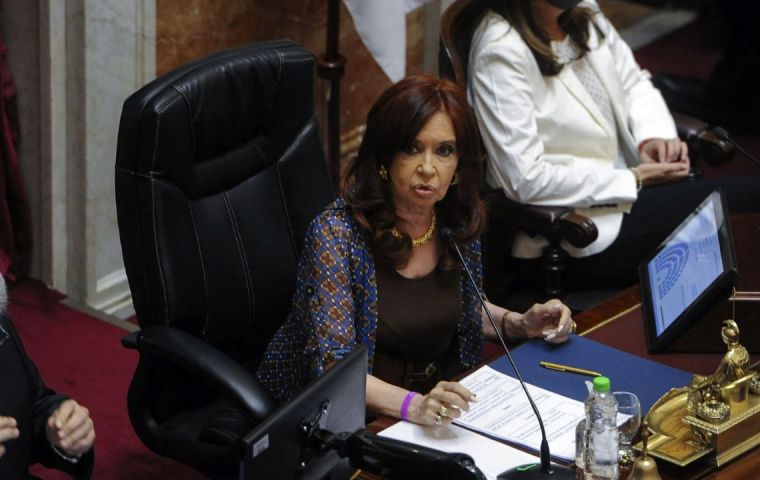MercoPress. South Atlantic News Agency
Cristina Fernández indicted in case of alleged bribes
 The ruling had the favorable votes of judges Diego Barroetaveña and Daniel Petrone, while magistrate Ana María Figueroa cast a vote against.
The ruling had the favorable votes of judges Diego Barroetaveña and Daniel Petrone, while magistrate Ana María Figueroa cast a vote against. A Federal Argentine Court rejected on Wednesday an appeal filed by the former president (2007-2015) and current vice president of the South American country, Cristina Fernandez de Kirchner, in relation to the so-called “case of the notebooks”.
The ruling, according to judicial sources quoted by EFE, which the vice president's defense will appeal, had the favorable votes of judges Diego Barroetaveña and Daniel Petrone, while magistrate Ana María Figueroa cast a vote against.
In September 2018, the judge Claudio Bonadio indicted Fernández and requested her preventive detention – which was not effective because she had privileges as senator – for the so-called “cause of the corruption notebooks”, considering that the former president was the head of an illicit association that operated between 2003 and 2015, as well as beneficiary of 27 acts of bribery.
In that sense, the highest criminal court rejected the complaint filed by the defense of the former President, the lawyer Carlos Beraldi, considering that the resolution of her prosecution “is not a final judgment or an order that puts an end to the action, the penalty or makes it impossible for the proceedings to continue”.
“In this line, the Supreme Court of Justice of the Nation has held that the pronouncements such as the one here appealed do not have the character of a final judgment, as long as its consequence is the obligation of the accused to continue undergoing criminal proceedings, since they do not put an end to the lawsuit or cause a grievance of impossible or insufficient subsequent reparation”, considered Barroetaveña, who acts as president of the court.
Likewise, the magistrate pointed out that there are no signs of “arbitrariness” or “federal issue” that would justify the opening of a cassation appeal, as requested by Fernández's defense.
The federal judge also maintained the embargo of 1.5 billion pesos (about 14 million dollars) imposed on the former president, since this type of precautionary measures “do not constitute a definitive sentence” and therefore are “not subject to appeal” before the Chamber of Cassation.
In her dissenting opinion, Judge Figueroa warned that although the resolution of the indictment is not definitive, “in exceptional cases it is comparable to such, since it causes a serious damage of impossible or delayed subsequent repair that requires immediate judicial protection”.
“Inferring the inadmissibility of the complaints filed on the basis of the foregoing violates elementary conventional and constitutional guarantees of due process of law and the right to defense in trial, placing the defendant in a state of defenselessness before the deprivation of the appeal instance”, the judge indicated.
The appeal
The vice-president's lawyer confirmed to EFE that they will take the case to the Supreme Court of Justice “through an extraordinary appeal”, so this prosecution “is not yet final”.
The “notebooks case”, one of the most mediatic corruption cases of the last years in Argentina, emerged when eight notebooks handwritten by a driver of the extinct Ministry of Federal Planning of Argentina, the most relevant of Kirchnerism, came to light in an investigation of the newspaper La Nacion.
These notebooks contained in detail the movements that the driver allegedly made during 10 years to collect large sums of money from powerful businessmen to be later delivered to high-ranking officials.
This case, of great media impact, keeps several former high-ranking Kirchnerist officials and businessmen in jail, while many others involved have admitted the existence of a corruption network.




Top Comments
Disclaimer & comment rules-

-

-

Read all commentsBet she didn't see that coming. She thought she'd taken care of that little problem when she got back into the government...
Feb 17th, 2022 - 12:34 am 0Tend to agree with IMOYARO's statement.
Feb 17th, 2022 - 09:00 pm 0However as she will no doubt retain her inmunity in 2023 by being elected Senator of some Province or another - any one will serve it's purpose - the whole situation will just go on for ever and no penalty will be forthcoming and even less of course of going to jail for more than evident corruption. Remember Carlos Menem who remained Senator until his passing away, although rarely if ever did he attend Congress in his latter years. No doubt Cristina will do exactly the same. Unless of course she happens not to be elected to Congress but personally consider that it's very unlikely that that will ever happen.
Well she might become a supreme court justice. Menem is a great example, but she'd have to get her son killed to complete the analogy... ;)
Feb 18th, 2022 - 03:28 am 0Commenting for this story is now closed.
If you have a Facebook account, become a fan and comment on our Facebook Page!